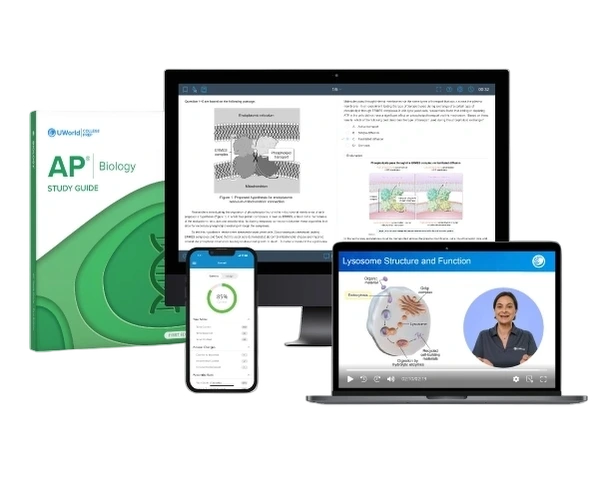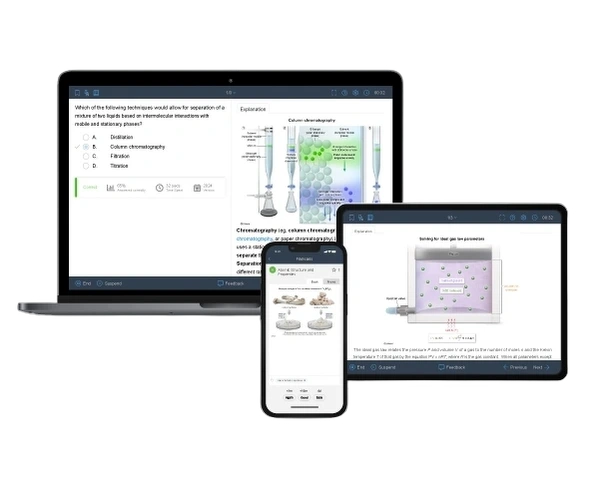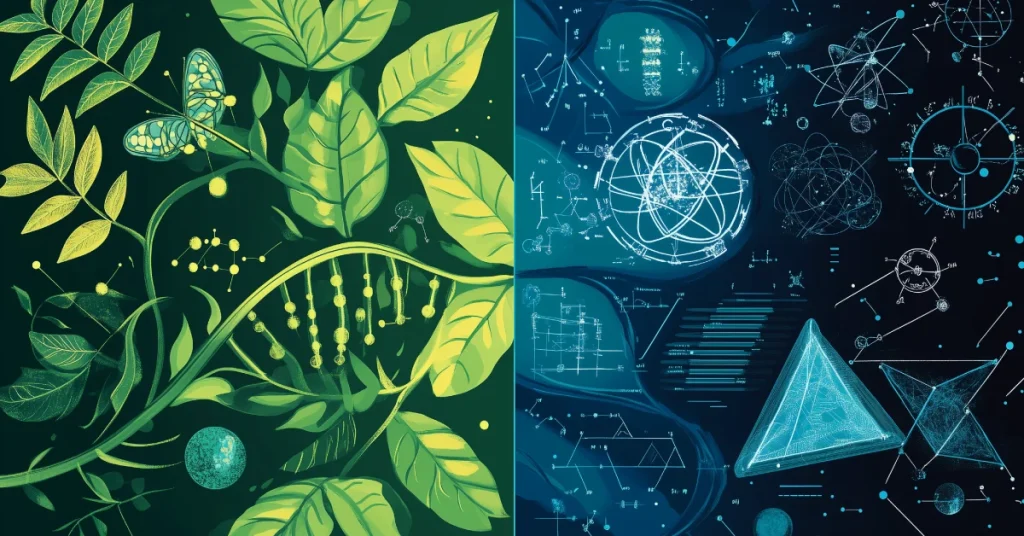Choosing the right AP course will help shape your academic path and future opportunities. These courses challenge you with college-level material, help you earn college credit and scholarships, and enhance your college applications.
AP courses such as biology and chemistry should align with your interests and career goals. Be mindful of the workload for each and research college credit policies to ensure your efforts align with your long-term plans.
Comparing AP Biology and AP Chemistry
AP Biology and AP Chemistry are rigorous AP courses that cater to different interests and goals. AP Biology focuses on life sciences and processes within living organisms, while AP Chemistry dives into chemical reactions and the principles governing matter.
Similarities of AP Bio and AP Chem
AP Biology and AP Chemistry share several similarities, making both ideal options if you’re looking to challenge yourself in science. From rigorous coursework to hands-on labs, here’s how these courses overlap.
Lab-Intensive Learning:
Lab work is a central aspect of both courses, allowing you to conduct experiments, interpret data, and apply scientific principles to real-world scenarios. This interactive component enhances critical thinking, problem-solving, and observational skills.
Critical Thinking and Problem-Solving:
Both courses emphasize critical thinking, data analysis, and problem-solving. They help you tackle complex scientific problems and apply your knowledge to unfamiliar situations — skills valuable in academics and careers.
College Credit Opportunities:
Achieving a high score on either AP exam can translate into college credits or scholarship opportunities, potentially saving you time and money while giving you a head start in your academic journey.
Differences Between AP Bio and AP Chem
In addition to their exam formats, AP Biology and AP Chemistry differ significantly in their focus, lab requirements, and career relevance. AP Biology dives into the complexities of living organisms, while AP Chemistry explores the behavior of matter and chemical processes. Here are the key differences.
Focus of Study:
AP Biology concentrates on life sciences, including genetics, cellular respiration, evolution, and ecosystems. It also covers the study of living systems and biological processes such as energy transfer, heredity, and ecological interactions. AP Chemistry explores the principles of chemistry, such as molecular structures, reaction rates, equilibrium, and energy changes. It examines the properties and transformations of matter, emphasizing atomic theory, bonding, and thermodynamics.
Lab Work Approach:
AP Biology labs investigate living organisms and processes, such as photosynthesis, cell division, and genetic traits. They include observational and experimental studies involving biological specimens and systems. AP Chemistry labs involve quantitative analysis, reaction mechanisms, and measuring properties of substances. They center on chemical experimentation, such as titrations, solution preparation, and reaction kinetics.
Career Relevance:
AP Biology is beneficial if you’re aiming for fields such as healthcare, environmental science, zoology, medicine, biotechnology, and ecology. AP Chemistry is ideal for careers in chemical engineering, research, applied sciences, and pharmaceutical and materials science.

Exam Format and Structure: AP Biology vs. AP Chemistry
Deciding between AP Biology or AP Chemistry may become easier if you know the test layout and how each course assesses your knowledge.
| AP BIOLOGY | VS | AP CHEMISTRY |
|---|---|---|
| Hybrid digital exam with 2 sections Multiple-Choice Questions: App Free-Response Questions: Paper |
FORMAT | Hybrid digital exam with 2 sections Multiple-Choice Questions: App Free-Response Questions: Paper |
| 3 Hours | DURATION | 3 Hours 15 Mins |
| A 4-function calculator is permitted throughout the exam | CALCULATOR USE | A scientific or graphing calculator is permitted for both sections |
| 60 Questions 1 Hour and 30 Mins 50% of Total Score |
SECTION I: MCQs | 60 Questions 1 Hour and 30 Mins 50% of Total Score |
| 6 Questions (2 Long, 4 Short) 1 Hour and 30 Mins 50% of Total Score |
SECTION II: FRQs | 7 Questions (3 Long, 4 Short) 1 Hour and 45 Mins 50% of Total Score |
| Data analysis and interpretation Application of scientific concepts Quantitative and graphing skills Experimental design and scientific reasoning |
SKILLS TESTED | Analysis and interpretation of models and data Experimental design and evaluation Quantitative problem-solving and calculations Scientific claims, reasoning, and data representation |
Is AP Bio Harder Than AP Chem?
When comparing the difficulty of AP Biology and AP Chemistry, several factors come into play, including the breadth of content, depth of knowledge required, and the application of concepts in real-world scenarios.
AP Bio covers a broad range of topics, from genetics and evolution to ecology and cell biology. The exam requires substantial memorization of concepts and an ability to apply them to real-world situations, such as understanding diseases. AP Chem explores chemical concepts and requires strong mathematical skills for problem-solving. AP Chemistry labs are generally considered more demanding due to the precise nature of chemical measurements and calculations. However, AP Biology labs can be tricky in their own way, as they require a deeper understanding of biological processes and the ability to apply that knowledge effectively.
Statistically, both exams have high percentages of students scoring 3 or above. AP Biology has a relatively stable performance, with more students consistently achieving higher scores across the years. In 2024, 68.3% of AP Biology students scored 3 or higher, slightly improving from 64.4% in 2023 and 67.8% in 2022. For AP Chemistry, 75.6% of students scored 3 or higher in 2024, a slight increase from 75.1% in 2023 and a significant rise from 54% in 2022.
Ultimately, the answer to the question, “Is AP Bio harder than AP Chem?” depends on your strengths. For instance, AP Biology may be more suitable if you’re skilled in memorization, while AP Chemistry caters to those with strong math and analytical abilities.
How to Make the Right Choice for Your Future: AP Biology or AP Chemistry?
Students often ask questions like, "Is AP Bio or AP Chem better for pre-med?" when deciding between these courses. Choosing between AP Biology and AP Chemistry is an important decision that can shape your academic journey. Here’s what you need to consider to help you decide which course aligns best with your goals and interests:
1. Consider Your Career Goals
| AP Biology | AP Chemistry | |||
|---|---|---|---|---|
1. Healthcare Professions If you aspire to work in healthcare — whether in medicine, nursing, or therapy — AP Biology is highly beneficial. It covers essential topics such as genetics, cellular processes, and human systems, providing a strong foundation for these fields. |
1. Chemical Engineering and Material Science AP Chemistry is essential for careers in chemical engineering or material science, where knowledge of chemical reactions, thermodynamics, and properties of matter are needed. |
|||
2. Environmental and Wildlife Science If you are considering a career in environmental science, ecology, or conservation biology, AP Biology offers in-depth coverage of ecosystems, biodiversity, and environmental processes. |
2. Pharmacology and Biotechnology AP Chemistry is indispensable for careers in the pharmaceutical industry and biotechnology, where understanding molecular structures, drug interactions, and chemical processes can help develop new medications. |
|||
3. Agriculture and Food Science AP Biology is helpful for careers in agriculture, where understanding plant biology, genetics, and ecosystems can enhance farming techniques and food production. |
3. Forensic Science and Criminal Justice AP Chemistry is relevant for careers in forensic science, where chemical analysis of evidence plays a critical role in criminal investigations. |
|||
4. Biomedical Research and Biotechnology AP Biology lays the groundwork for careers in biomedical research, biotechnology, and genetic engineering, where understanding molecular biology and genetics is key. |
4. Food Chemistry and Toxicology AP Chemistry is helpful for careers in food science, nutrition, and toxicology to understand food composition, safety, and the impact of chemicals on human health. |
2. Personal Aptitude and Interests
| AP Biology | AP Chemistry | |||
|---|---|---|---|---|
1. Interest in Environment and Living Organisms AP Biology covers a broad range of topics that explore the diversity of life, from microorganisms to complex ecosystems. If you are interested in environmental science, ecology, or health sciences, this course provides the knowledge to dive into these fields. |
1. Interest in Chemical Principles and Laboratory Skills If you are more intrigued by how chemicals behave in the world around you — from air pollution to industrial processes — AP Chemistry provides the foundational knowledge of chemical reactions, thermodynamics, and the periodic table. |
|||
2. Focus on Critical Thinking If you're drawn to critical thinking, analyzing complex biological phenomena, and understanding their broader implications, AP Biology encourages you to think critically about issues such as genetics, evolution, and disease. |
2. Focus on Practical Application If you prefer applying scientific knowledge to solve practical problems — such as figuring out chemical reactions, calculating reaction rates, or analyzing substances — AP Chemistry emphasizes practical lab skills and quantitative analysis. |
|||
3. Dynamic, Ever-Changing Disciplines Biology constantly evolves with new discoveries in genetics, molecular biology, and environmental science. If you enjoy staying updated on the latest scientific breakthroughs and exploring cutting-edge areas like biotechnology, AP Biology offers room for growth and innovation. |
3. Stable, Core Scientific Principles Chemistry deals with well-established principles and predictable patterns. If you enjoy mastering core principles and applying them to solve complex, real-world problems in controlled lab environments, AP Chemistry offers the structure you might enjoy. |
|||
4. Big-Picture Learning If you prefer a broad, conceptual understanding of life, where you can make connections between different systems such as how genetics impacts evolution or how ecosystems balance, AP Biology offers an expansive view of the biological world. |
4. Technical Precision If you thrive in a more structured environment where precision and technical skills are crucial, AP Chemistry will appeal to you. It requires attention to detail in lab work and mathematical problem-solving, making it a good fit for those who enjoy accuracy. |
Taking Both AP Biology and AP Chemistry
You can take AP Biology and AP Chemistry in the same year. Here are a few perspectives to help you evaluate this decision:
| Pros | Cons | |||
|---|---|---|---|---|
1. Comprehensive Scientific Foundation Both courses offer a well-rounded understanding of science, combining biology's study of life with chemistry’s exploration of the molecular world. This dual foundation is particularly beneficial if you plan to pursue a career in medicine, pharmaceuticals, or environmental science. |
1. Overlapping Content Although both courses cover different areas of science, there is some overlap, especially in topics related to biochemistry and cellular processes. This overlap can lead to confusion, as the content may be presented from different perspectives in each course, requiring extra effort to reconcile the differences. |
|||
2. Enhanced Problem-Solving Skills Both courses require strong analytical skills, so you will help develop your ability to think critically, analyze data, and solve complex problems from different scientific perspectives. This can sharpen your scientific reasoning and prepare you for future academic challenges. |
2. Heavy Workload Both courses require significant time and effort for reading, studying, and completing assignments. Juggling both may lead to a heavy workload that can cause stress or burnout, especially if you have extracurricular activities and other commitments. |
|||
3. Increased College Admissions Appeal Successfully completing both courses can demonstrate academic rigor, commitment, and strong work ethic to college admissions committees. It shows you are willing to challenge yourself and have the discipline to manage demanding coursework. |
3. Potential for Lower Scores The sheer volume of material to be learned and the intensity of both courses may result in a lower performance on each exam. Managing 2 exams with complex content could lower your chances of achieving a top score in both. |
|||
4. Better Preparation for Advanced Science Courses If you plan to take advanced science courses in college, having a solid grasp of both courses will provide a competitive advantage. Many science-related college majors, especially in the health and research fields, require knowledge of both subjects. |
4. Higher Risk of Stress Balancing the complexity of both courses may cause added stress. The intense workload and rigorous exams for both courses can be overwhelming, especially during peak testing seasons. |
5 Tips for Managing Both Courses
If you decide to take AP Biology and AP Chemistry in the same year, here are 5 tips for managing the workload and maximizing your learning:
- Start Early with Course Materials: Start familiarizing yourself with AP Bio and AP Chem topics as soon as the school year begins.
- Set Weekly and Monthly Goals: Plan your studies to avoid overdoing it, and use a planner to track your progress.
- Alternate Study Sessions: Avoid studying both subjects back to back. Instead, alternate study sessions to maintain focus and prevent fatigue.
- Use AP-Specific Study Resources: Invest in high-quality prep resources, tools, and books. Our prep courses (AP Biology and AP Chemistry), QBanks, and study guides offer exam-like practice questions, detailed answer explanations, and interactive learning features to help you excel on your AP exam.
- Plan Breaks and Downtime: Schedule short breaks during your study sessions to stay refreshed and focused.

References
- AP Biology: About the Course. (2025). apstudents.collegeboard.org. Retrieved January 28, 2025, from https://apstudents.collegeboard.org/courses/ap-biology
- AP Biology: About the Exam. (2025). apstudents.collegeboard.org. Retrieved January 28, 2025, from https://apstudents.collegeboard.org/courses/ap-biology/assessment
- AP Chemistry: About the Course. (2025). apstudents.collegeboard.org. Retrieved January 28, 2025, from https://apstudents.collegeboard.org/courses/ap-chemistry
- AP Chemistry: About the Exam. (2025). apstudents.collegeboard.org. Retrieved January 28, 2025, from https://apstudents.collegeboard.org/courses/ap-chemistry/assessment
- 2024 AP Score Distributions. (2024). apstudents.collegeboard.org. Retrieved January 28, 2025, from https://apstudents.collegeboard.org/courses/ap-chemistry/assessment
- AP Biology Course and Exam Description. (2020). apcentral.collegeboard.org. Retrieved January 28, 2025, from https://apcentral.collegeboard.org/media/pdf/ap-biology-course-and-exam-description.pdf
- AP Chemistry Course and Exam Description. (2024). apcentral.collegeboard.org. Retrieved January 28, 2025, from https://apcentral.collegeboard.org/media/pdf/ap-chemistry-course-and-exam-description.pdf








